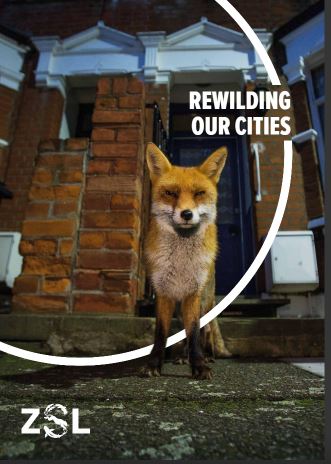“… could protect humanity against the worsening impacts of climate change, such as flooding and heatwaves, while helping to restore biodiversity.”
.
We need to be increasing the amount of wildlife habitats in our urban environments.
A National Geographic report last month showed that this might well be happening:
Rewilding the UK one abandoned lot at a time
A report just out from the ZSL Institute of Zoology is saying this would really be of benefit:
Rewilding our cities could reduce impacts of extreme weather, says new report
A landmark report by ZSL shows how increased urban rewilding efforts could boost wildlife and buffer city dwellers from the worst impacts of climate change.

Large-scale nature recovery in urban areas could protect humanity against the worsening impacts of climate change, such as flooding and heatwaves, while helping to restore biodiversity says new report published by international conservation charity ZSL (Zoological Society of London).
ZSL’s Rewilding our Cities report (published today, Thursday 22 September 2022), not only lays out the benefits of rewilding urban areas but shows how it can be done at scale. The report says spaces like private gardens, green spaces owned by councils, businesses and religious groups and public spaces such as parks, urban waterways, estuaries and wetlands, as well as less obvious areas such as railways, are key locations where rewilding could be implemented at a scale big enough to make a difference.
With two out of three people likely to be living in cities or other urban environments by 2050, rewilding not only provides new ways to engage urbanites with nature – improving their wellbeing and mental health – but could improve climate change mitigation and adaptation, reduce disaster risk and pollution levels, and slow down or even help reverse biodiversity loss.
Lead author and climate and biodiversity expert at ZSL’s Institute of Zoology, Dr Nathalie Pettorelli said: “Wildfires, floods and heatwaves across the world have brought the climate crisis to the fore for many people this year. The interconnection of the climate crisis with the loss of nature is thankfully now widely recognised and rewilding is an approach being increasingly embraced. However, the large-scale rewilding of urban spaces including creating nature corridors and wild spaces around city infrastructure is something that has so far been relatively overlooked as part of the solution. This is the first report of its kind to lay out a roadmap for rewilding our cities and we believe this is a high-impact solution to jointly address the climate and biodiversity loss crises in a low cost, ‘hands off’ way.”
Today’s Western Morning News carries the piece from The Independent:
Rewilding in cities can tackle climate-driven heatwaves and floods – ZSL
The Mail also looks at the report:
‘Rewilding’ cities by creating nature corridors and wild spaces could protect humanity against the worst impacts of climate change, report suggests
- Globally, two-thirds of people are set to live in cities and other areas by 2050
- In the face of climate change they are at increasing risk of heatwaves and floods
- Restoring biodiversity could buffer city dwellers from climate change
- It could also help boost urban wildlife via habitat creation, according to ZSL
The Guardian carries a warning made explicit by the report’s author:
Green gentrification’ due to rewilding could force out poorer communities
Report says urban nature restoration projects must be handled carefully to avoid pricing out locals
Poorer communities could be forced out of their areas by rewilding because of “green gentrification”, according to a report by the Zoological Society of London (ZSL). The report finds that rewilding could lead to house prices rising as areas become more desirable and their risk of being affected by natural disasters such as floods decreases. New tourist opportunities may also result from enhanced green spaces and wildlife.
Without careful implementation, the report authors note, “green gentrification” could take place, with local communities priced out of their areas. The report recommends that sociologists and other experts, as well as local communities, are consulted and worked with during any urban nature restoration project.
The report’s author, Nathalie Pettorelli, from the ZSL Institute of Zoology, told the Guardian: “[The rewilded area] could be created in areas of deprivation and you could cause green gentrification. It’s greener, and because it’s greener and nicer the house prices go up. This is not just an ecological problem, it is a socioecological problem; you have to factor people in all the time and find whether you are going to create inequalities.”
This is not just an issue with nature restoration, she said, but any improvements made to urban areas, with safeguards needed to ensure local communities get to stay and enjoy the new or improved green spaces, and have a say in what is created.